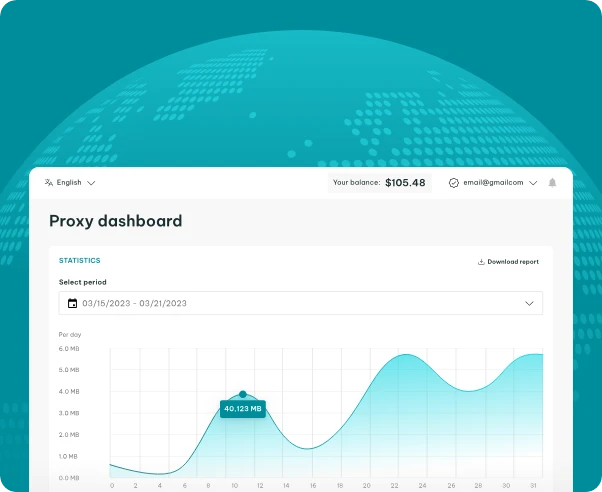The Most Reliable Thailand Proxies at Your Fingertips
At IPRoyal, your proxy needs are our number one priority. We offer state-of-the-art datacenter, residential, mobile, and sneaker proxies. These are designed with reliability, efficiency, affordability, and speed in mind. Accordingly, you get 99% uptime and zero fail rates when you choose to work with our Thailand IPs. You get access to 430,750 Thailand IPs when you sign up for our service. What’s more, our team is constantly working on adding more IPs to our pool, guaranteeing you a seamless experience and functionality. Whether in business, education, or entertainment, our Thailand proxy service will work perfectly for you.



As seen on
Types of Proxies
ISP
-
Unlimited Traffic
-
99.9% Uptime
-
Premium ISP Providers
-
Not Shared
-
SOCKS5 Supported
Most popular
Rotating Residential
-
195 Countries Available
-
Traffic Never Expires
-
SOCKS5 Supported
-
City/State Targeting
-
Flexible Rotation
Datacenter
-
Unlimited Traffic
-
99.9% Uptime
-
Not Shared
-
40+ Locations
-
SOCKS5 Supported
Mobile
-
Unlimited Bandwidth
-
4.5M+ Residential IPs
-
Auto-Rotate Toggle
-
API Access
-
5G/4G/3G Support
Best proxy servers 2025
- Kranuan
- Phibun Mangsahan
- Khlung
- Lang Suan
- Phanat Nikhom
- Ban Sam Khwai Phueak
- Phon
- Wang Saphung
- Kuchinarai
- Don Sak
- Tha Maka
- Lom Sak
- Kantang
- Kaeng Khoi
- Song Phi Nong
- Bua Yai
- Det Udom
- Pak Thong Chai
- Sai Buri
- Dok Kham Tai
- Bang Racham
- Aranyaprathet
- Thoen
- Taphan Hin
- Ban Ton Pao
- Ban Thung Tam Sao
- Ban Na Kham
- Si Satchanalai
- Sawankhalok
- Ban Dung
- Ban Pong
- Ban Thum
- Sikhio
- Tha Bo
- Sam Phran
- Tak Bai
- Ban Mae Kha Tai
- Kantharalak
- Ban Bueng
- Ban Na San
- Ban Tha Kham
- Pak Phanang
- Ban Piang Luang
- Mae Sai
- Sadao
- Wang Nam Yen
- Nang Rong
- Wichian Buri
- Ban Mae Cho
- Ban Patong
- Si Racha
- Ban Phru
- Sattahip
- Takhli
- Betong
- Kathu
- Ban Nong Sam Rong
- Ban Chang
- Warin Chamrap
- Ban Phai
- Ban Pak Phun
- Phra Phutthabat
- Ban Ang Sila
- Ban Aranyik
- Cha-am
- Thung Song
- Pak Chong
- Mae Sot
- Chum Phae
- Ban Bang Khu Lat
- Muban Phimon Rat
- Su-ngai Kolok
- Singhanakhon
- Ban Saen Suk
- Ban Bang Mae Nang
- Ban Plai Bua Phatthana
- Ban Om Noi
- Khlong Luang
- Hua Hin
- Ban Map Ta Phut
- Ban Lam Sam Kaeo
- Ko Samui
- Ban Suan
- Ban Nong Prue
- Trat
- Phangnga
- Ban Laem Chabang
- Lamphun
- Chai Nat
- Ang Thong
- Uthai Thani
- Sukhothai
- Ranong
- Nakhon Nayok
- Pathum Thani
- Phrae
- Phra Pradaeng
- Tak
- Phayao
- Prachin Buri
- Sa Kaeo
- Sing Buri
- Yasothon
- Nan
- Nong Bua Lamphu
- Ratchaburi
- Phetchabun
- Chaiyaphum
- Phichit
- Loei
- Satun
- Phetchaburi
- Chanthaburi
- Chachoengsao
- Surin
- Lop Buri
- Ban Sai Ma Tai
- Krathum Baen
- Narathiwat
- Ban Khlong Ton Madua
- Si Sa Ket
- Amnat Charoen
- Nakhon Phanom
- Suphan Buri
- Pattani
- Bang Kruai
- Nong Khai
- Buri Ram
- Kamphaeng Phet
- Samut Songkhram
- Kanchanaburi
- Ban Krathum Lom
- Krabi
- Bang Bua Thong
- Maha Sarakham
- Chon Buri
- Sakon Nakhon
- Prachuap Khiri Khan
- Lampang
- Ban Bang Krang
- Phra Nakhon Si Ayutthaya
- Mukdahan
- Samut Prakan
- Chumphon
- Uttaradit
- Kalasin
- Ban Bang Kaeo
- Roi Et
- Phatthalung
- Trang
- Yala
- Samut Sakhon
- Saraburi
- Rayong
- Songkhla
- Phitsanulok
- Chiang Rai
- Nakhon Pathom
- Ubon Ratchathani
- Ban Talat Rangsit
- Phuket
- Nakhon Sawan
- Nakhon Si Thammarat
- Phatthaya
- Khon Kaen
- Udon Thani
- Surat Thani
- Nakhon Ratchasima
- Chiang Mai
- Hat Yai
- Pak Kret
- Nonthaburi
- Bangkok
Why Use A Thailand Proxy Server?
Our Thailand proxies pose several benefits in different use cases and niches. Below are some of the various instances in which our Thailand proxy servers can come in handy:
-
Increased privacy
Your internet connection is never private, at least not unless you’re using reliable proxy servers. This is because the websites will try and collect your data. Other unscrupulous parties masquerading as legitimate services can try and hack your secure connections to access your private data. The best way to protect yourself is by utilizing our robust, secure, and reliable Thailand proxies. Our IPs can keep your internet connection and ensure your digital footprint cannot be tied to you.
-
Data scraping
Data is becoming currency as you can convert it into a revenue-generating channel. Data scraping is one of the most popular ways of collecting data from the web. With a good proxy, such as our Thailand IPs, you can scrape data confidently from even the most challenging source without worrying about detection and restriction. Our IPs use modern technology to ensure you stay ahead of your peers by scraping data efficiently and securely. You can use this data for lead generation, product pricing, and competitor analysis, among many other applications.
-
Content administration
You might find yourself in a situation where you need to regulate the content available to people under you. This can apply to different situations. Say, for instance, you are an employer, and your employees get distracted by unnecessary internet content. Or, you could be a parent that wants to protect your children from adult-rated content on the internet. Our Thailand proxies could come in handy in such situations. They can be configured to filter internet content and restrict specific genres depending on the need.
-
Social media management
Social media use has shot upwards over the past couple of years. In fact, according to reports, there are approximately 56.85 million social media users in Thailand. This points to a lucrative audience reach channel businesses could utilize. That said, our Thailand proxies can help in all aspects of social media management, including automated posting, managing multiple social media accounts, and social media growth.
-
Unrestricted content
It is normal for internet content to be restricted to particular regions. Several factors can lead to such instances, including government regulations and copyright. Regardless, you will likely find it incredibly frustrating when you can’t access a particular piece of content on the web due to such rules. Luckily, our Thailand IPs can help you bypass such regulations and access the web without worrying about censorship.
-
Market analysis
Market analysis is a critical aspect of modern business operations. It allows entrepreneurs to get familiarized with market segments and develop strategies for marketing and building brand loyalty. Our proxies can help you access data from any source on the internet, no matter how complicated. This way, you can stay ahead of your competitors with the right data at hand.
Who Can Take Advantage of Thailand Proxies?
Our Thailand proxies have a wide variety of use cases, whether in the business, education, or entertainment niche. Companies can use a Thailand IP address to conduct various corporate activities such as ad verification, data scraping, market analysis, product development, and more. Institutions also stand to gain a lot from our network, from improved privacy to content administration.
Individual internet users also have a lot to gain from our Thailand proxies. You could utilize our IP pool for improved privacy while browsing the web. Our Thailand IPs use state-of-the-art encryption technology, ensuring your internet activity is completely anonymous. Furthermore, parents can use our technology to filter adult content and ensure children are safe on the web.

-
Why You Should NOT Use a Free Thailand Proxy
You might be tempted to opt for a free Thailand proxy. Such IPs have only one advantage – they are free of charge. Other than that, there is nothing much you can gain from them. For the most part, they tend to be unreliable and perform poorly. This is because they are implemented by many users, which translates to poor performance. Moreover, some free proxies are data collection and hacking scams. The providers use them to monitor users and steal confidential data, which is then sold to third parties at a fee. This is why you should stay away from free proxies. The best option would be to go for premium ones.
-
Use the Fastest Thailand Proxy Addresses
Our Thailand proxy service is designed to offer maximum speeds without compromising quality. With 99% uptime and zero fail rates, you are guaranteed the best performing Thailand IPs in the market. That is not all. Over 430,750 IPs allow you to conquer the internet without any hindrance. If you encounter any issues, our customer support team is available 24/7 to answer your queries. Furthermore, we have designed our plans to offer the best when it comes to customization, meaning you can scale up and down depending on your needs. It does not get any better than our Thailand proxy servers!
-
Try our best Thailand IP Addresses
We stand at the very top when it comes to quality Thailand proxies. Our IPs are carefully selected to provide optimum performance, which includes 99% uptime, zero fail rates, and incredible speeds. With us, you get amazing customization plans that allow you to utilize our Thailand proxy network according to your needs. If any issues arise while utilizing the proxies, our support team can tend to your queries 24/7. Our exceptional services have enabled us to attract corporate clients from all over the world. Whether it is ad verification, sneaker copping, data scraping, accessing restricted content, or content administration, our proxies can handle it. Get in touch with us today!
Use Cases in Thailand
FAQ
What is a proxy?
Simply put, a proxy is a device connected to the internet with its own IP address. It works as an intermediary between you and the rest of the internet. A proxy handles all your requests and keeps your IP concealed while providing various other useful functions along with privacy and security benefits depending on your needs.
How to use Thailand proxy?
A proxy server doesn’t just keep your private information safe. Thailand proxies feature all sorts of options for different types of users. Companies can benefit from anonymous data scraping, global ad verification, and improved corporate privacy. Home users have the option to restrict access to specific content types and enjoy better deals on goods and services online.
What is an SSL/HTTPs proxy?
SSL proxies are a transparent proxy type that enforces Secure Sockets Layer (SSL) encryption and decryption of traffic between clients and servers. Both the server and the client are unable to detect its presence. HTTPs proxies ensure communication between the client and the server with end-to-end security by establishing a secure channel for requests and returning information.
What is a residential proxy?
A residential proxy uses an IP address assigned to a device by an internet service provider (ISP) along with its physical location. A residential proxy replaces your IP address with its own, hiding your identity online and maintaining your anonymity. They’re a perfect choice for web scraping, ad verification, and other scenarios where preserving your anonymity is a must.